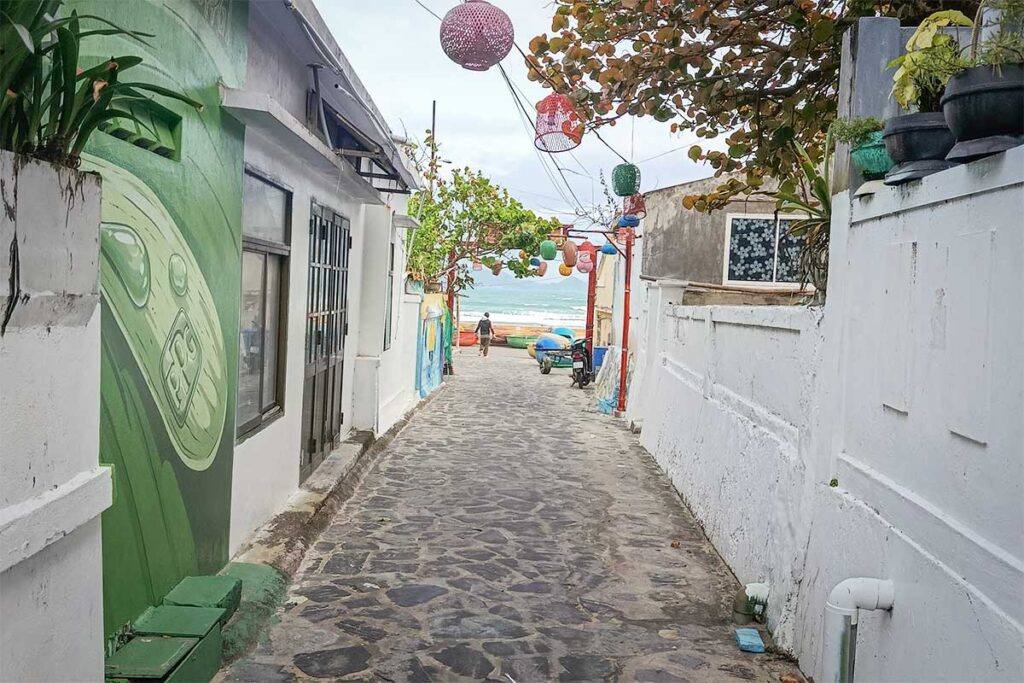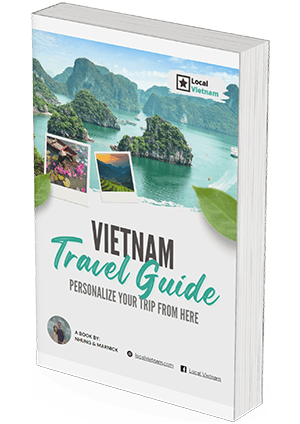What is Nhon Ly village and its beach like?
Setting and village character
Nhon Ly sits on the Phuong Mai Peninsula about 20 km from Quy Nhon, across the Thi Nai bridge. The low-rise village lies between a sandy bay and rocky headlands, with blue-white alleys, simple murals, stone walls, and red-tiled roofs.
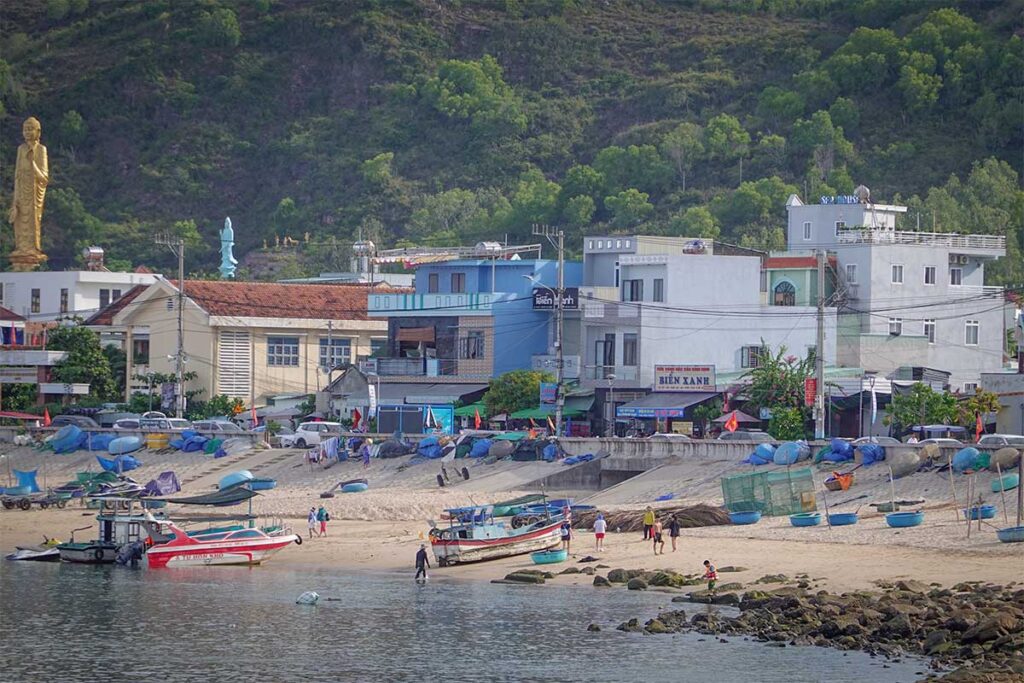
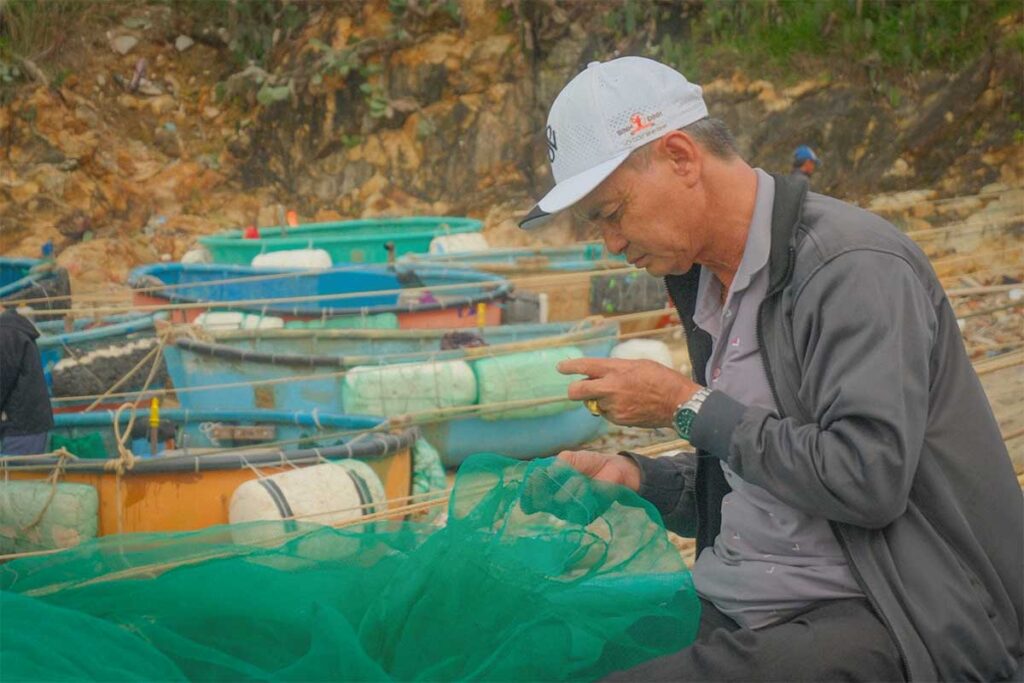
Mornings and late afternoons follow the fishing rhythm—basket boats on the sand, nets drying, coffee stalls opening—while local temples reflect whale-worship traditions and older features like the communal well tell you this place grew around the sea.
The beach and tourism today
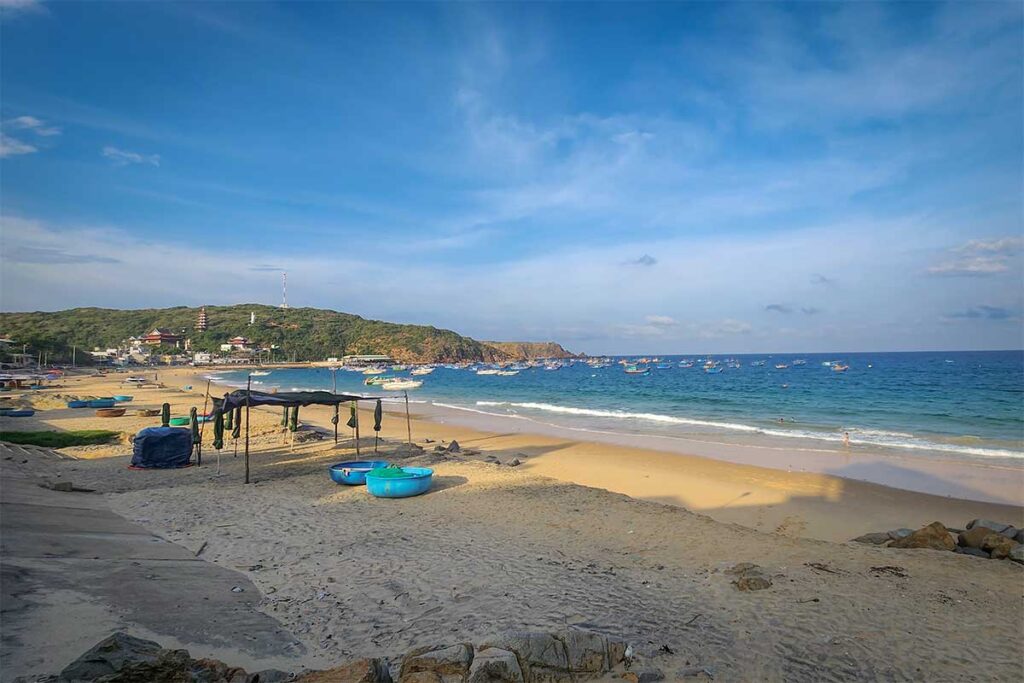
The village beach is broad with gentle entry in parts, but it is a working shoreline: expect boats, nets, and gear on sections of the sand. You can swim on quieter stretches and sunsets are lovely, though shade and facilities are limited and cleanliness is best away from the boats and outflows.
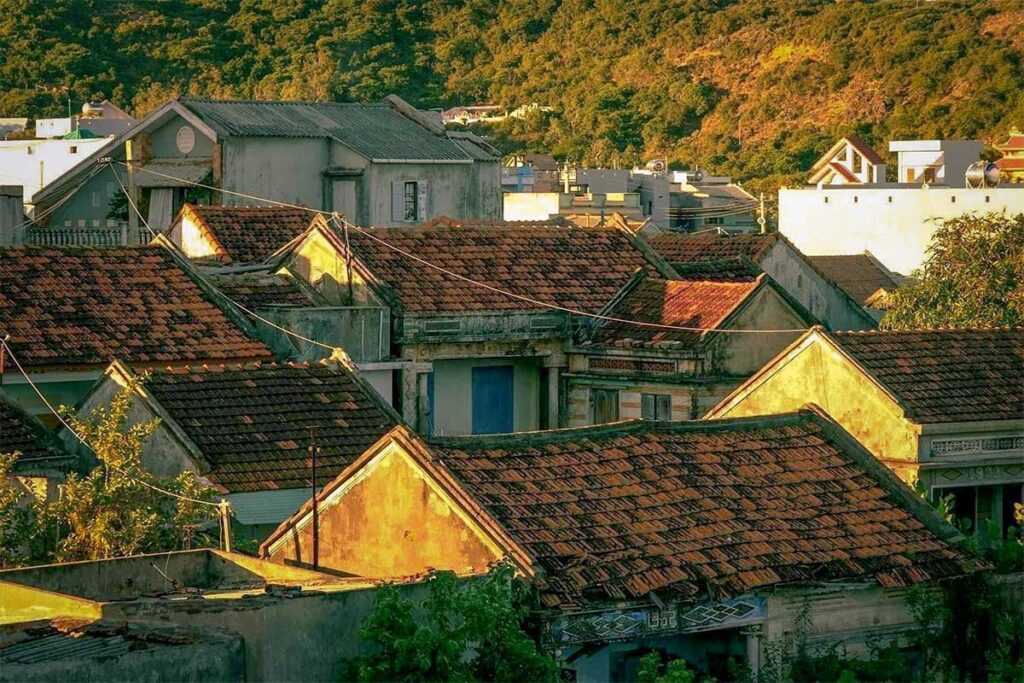
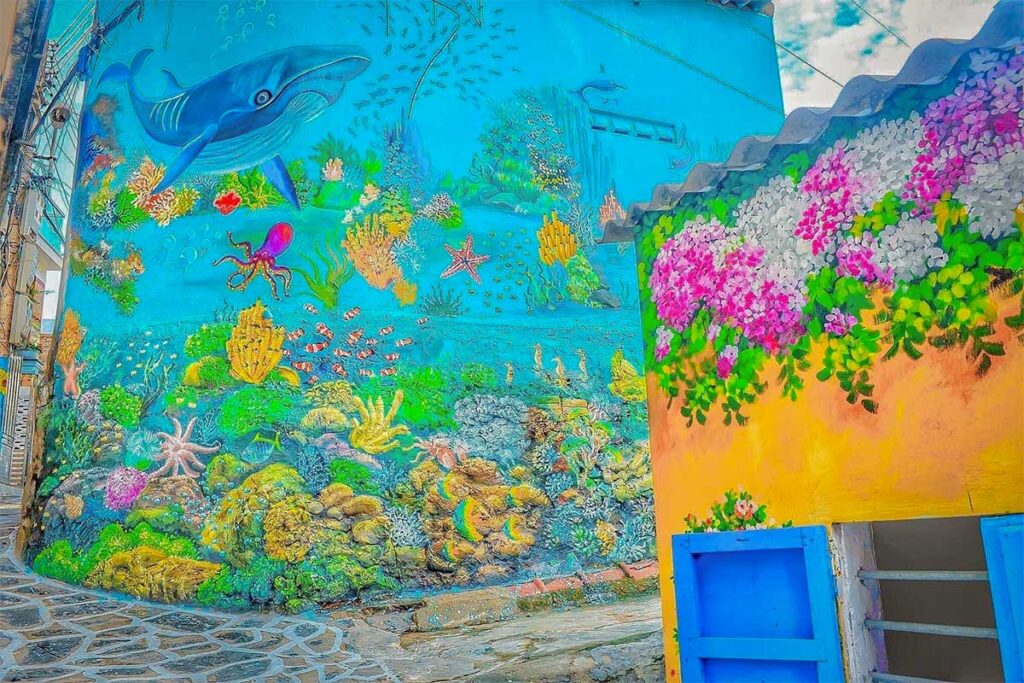
Tourism stays low-key—homestays, simple seafood places, a couple of cafes—and most visitors pair a stroll here with Eo Gio or a short boat hop to Ky Co. It is authentic over polished: steep lanes, limited services, and a beach better suited to a walk and a quick dip than an all-day lounge.
Highlights of visiting Nhon Ly fishing village
This is a half-day kind of place. Think village first, light tourism second: slow wander, simple eats, a beach stroll, and one or two short add-ons. If you blitz it, you can see the essentials in 60–90 minutes; give it two to four hours if you want coffee, photos, and sunset on the sand. Don’t expect a long list of “attractions”—the appeal is everyday coastal life on the edge of Quy Nhon.
1. Wander the blue-white alleys and mural streets
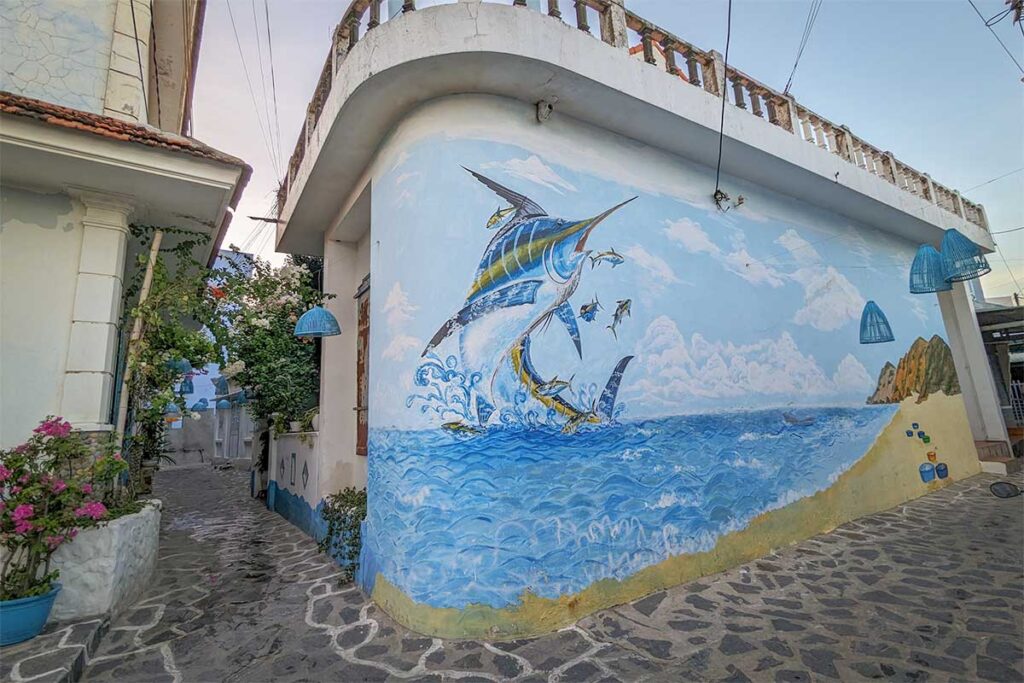
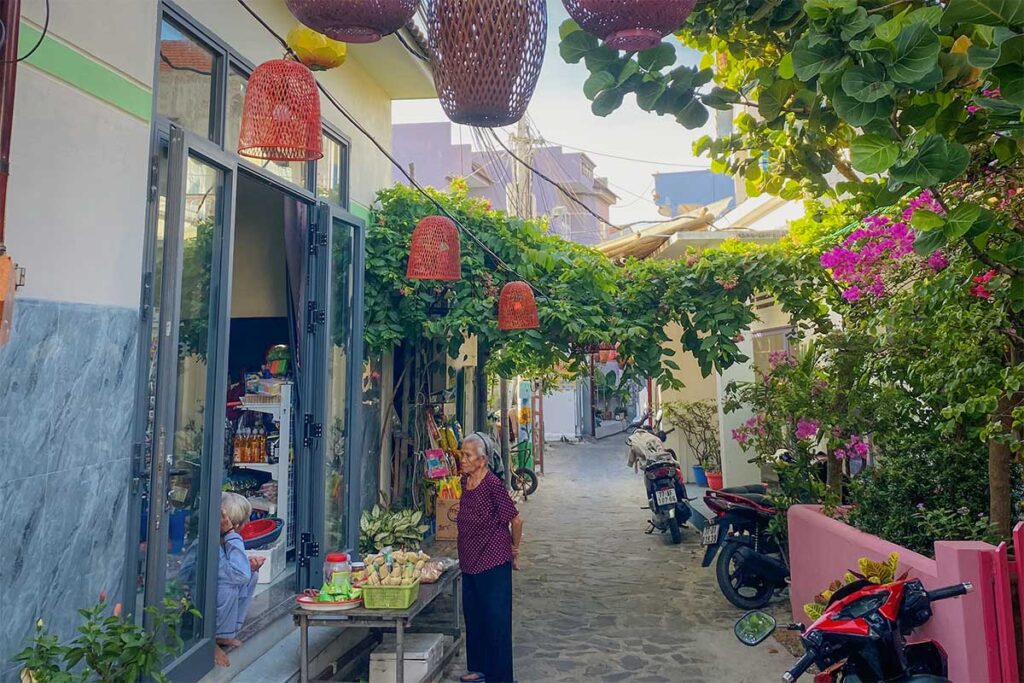
The surprise in Nhon Ly is how pretty the lanes feel without trying too hard—blue-white walls, small murals, stone fences, red-tiled roofs, and the odd splash of color from doorways and boats.
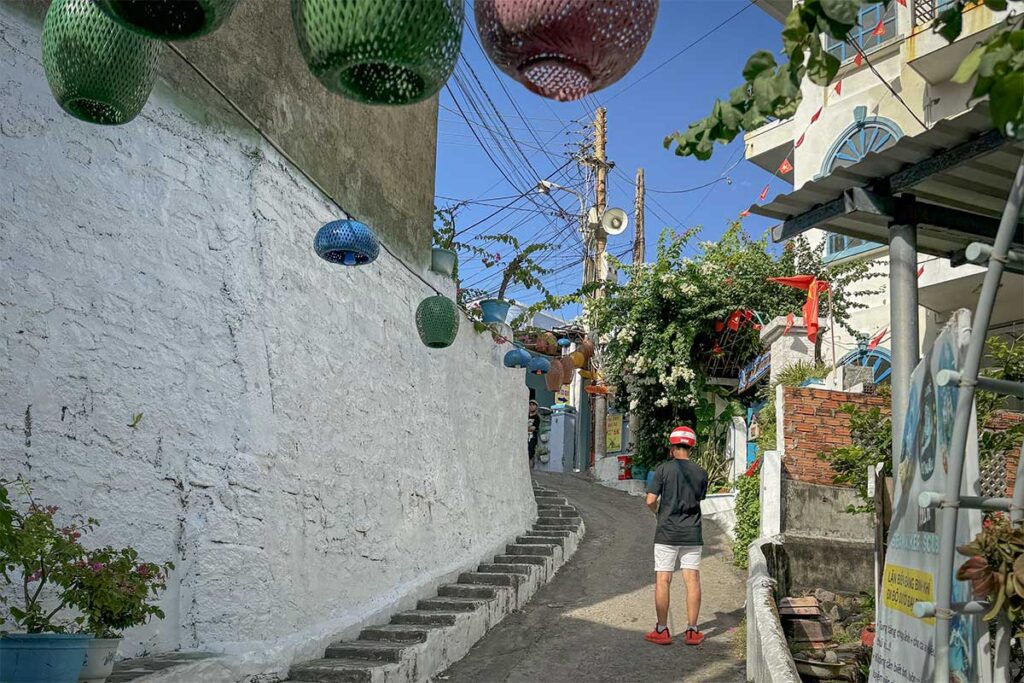
Start at the seafront and drift inland; the lanes rise and fall, so wear decent sandals. Early and late have softer light, open doors, and kids on bikes. It’s casual and photogenic, but remember people live here—step aside for scooters and ask before close-ups.
2. Morning fish market and boat landings
This is a fishing village before anything else, and dawn is when it shows. Boats glide in, baskets come ashore, and a tiny market hums along the waterfront. Stand back from the working area, buy fruit or a snack, and watch the choreography: nets spread, catch sorted, ice shoveled. If you’re planning lunch later, a quiet “where’s good today?” to a fishmonger can point you to a quán cooking the freshest haul.
3. Nhon Ly Beach: sunset strolls and casual swims
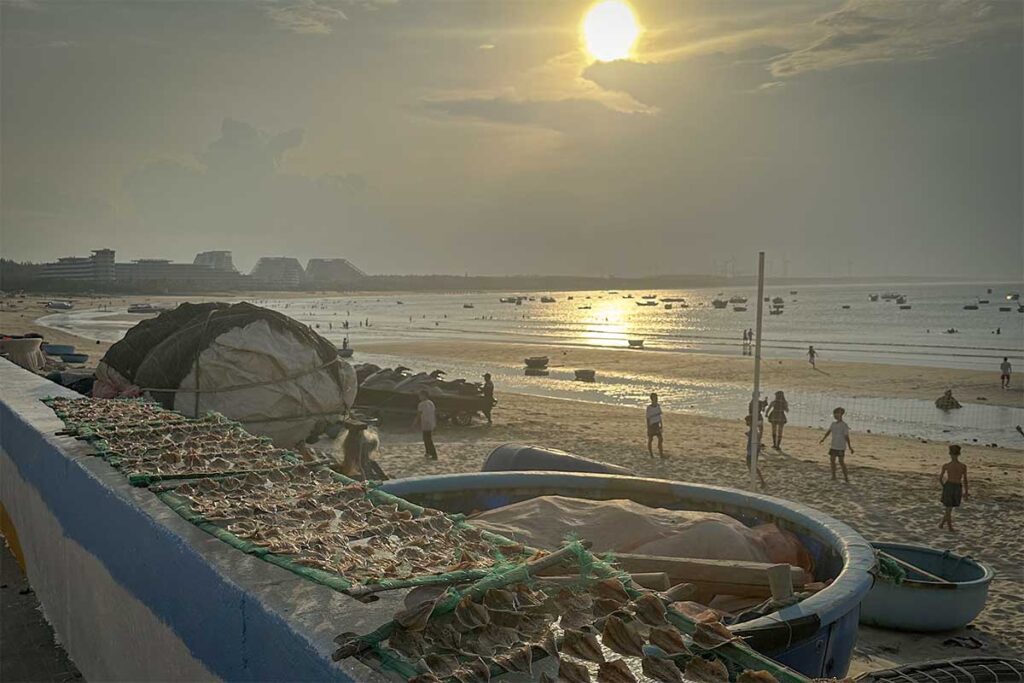
The village also has a broad beach, used mostly by locals. You’ll see basket boats pulled up on the sand—they ferry people to the larger fishing boats moored in the bay—and in late afternoon the village drifts down to cool off.
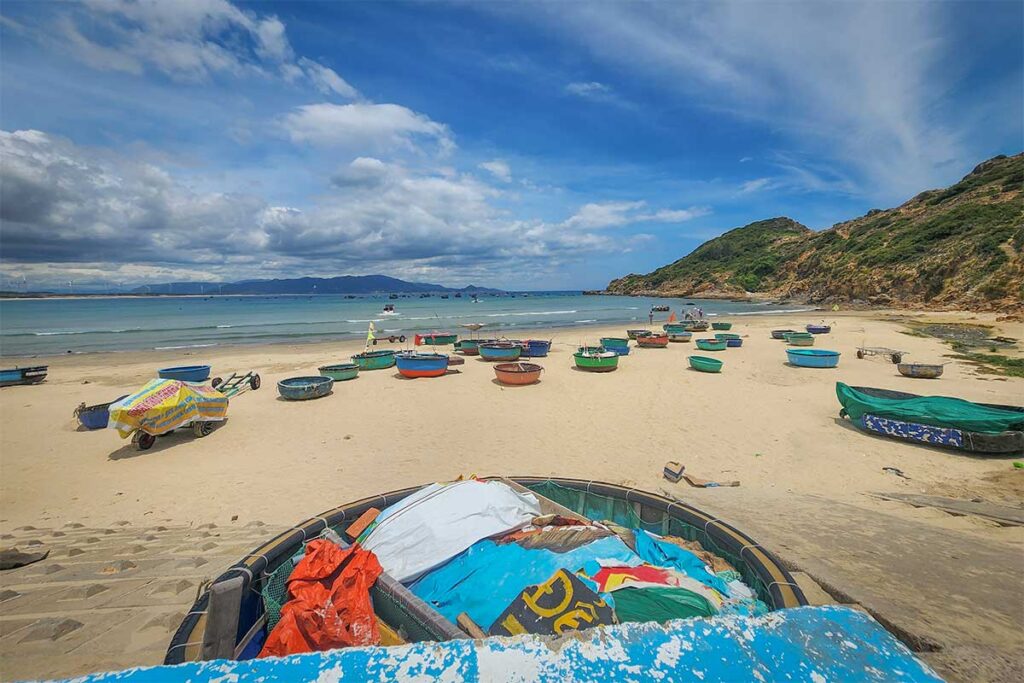
You can swim here, but it’s not a resort beach: little natural shade at midday, and the sand can be scruffy near the boats or any outflow. For a dip, head to the quieter stretches away from boats; bring your own towel, water, and a light cover-up for walking back through the lanes.
4. Eo Gio cliff boardwalk (rocky viewpoint, not a swimming spot)
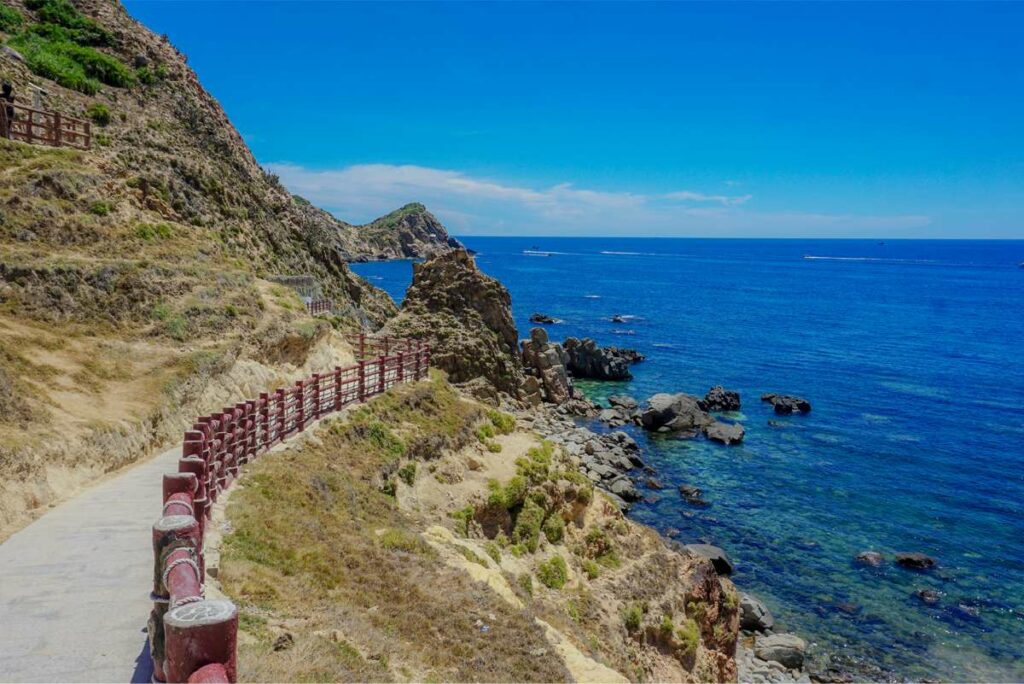
Five minutes from the village, Eo Gio is a short cliff walk with big sea views—steps and railings trace an amphitheater of rock above clear water. Figure on 30–60 minutes unless you’re setting up a tripod. There’s a small entrance fee, and it’s exposed and often windy, so go early or late and keep a hand on little kids near the edges. It’s a scenic add-on to a Nhon Ly visit, not a beach stop.
5. Boat to Ky Co from Nhon Ly
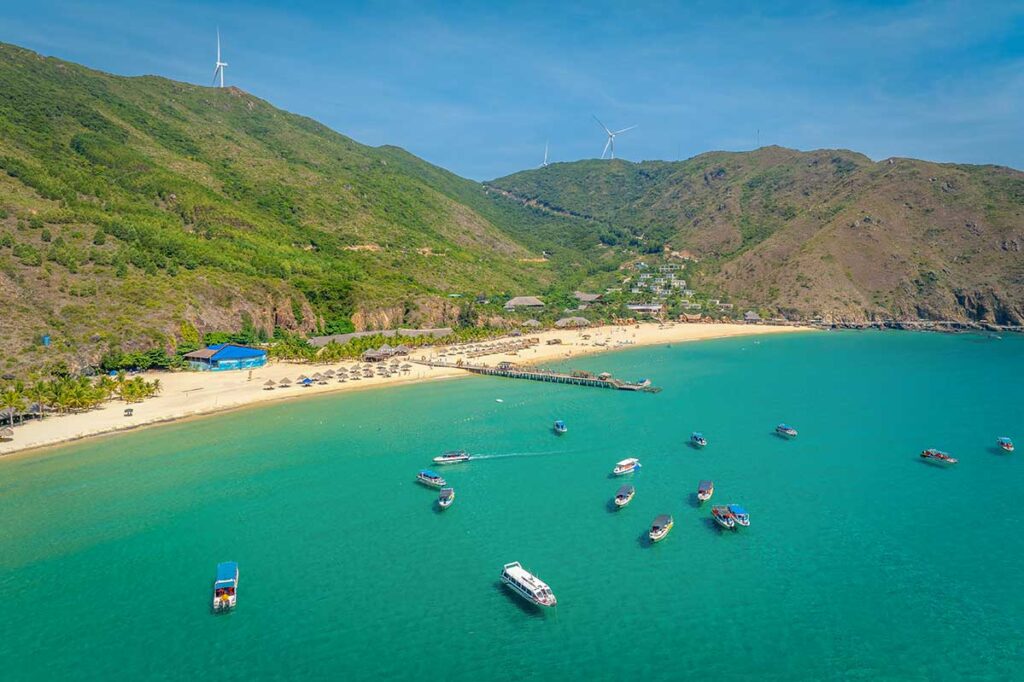
When seas are calm, small speedboats (often called “canoes” locally) run from the village piers to Ky Co in about 10–15 minutes. Operators sell simple packages: boat transfer, beach time, sometimes a short snorkel stop. Prices vary by season and inclusions, so confirm what you’re paying for—transfer only or beach entry and gear as well—before you hand over cash. Mornings are smoother, afternoons windier; trips cancel if the water turns rough. Wear the life jacket, bring a dry bag, and don’t count on lockers.
6. Simple seafood lunch or a coffee stop
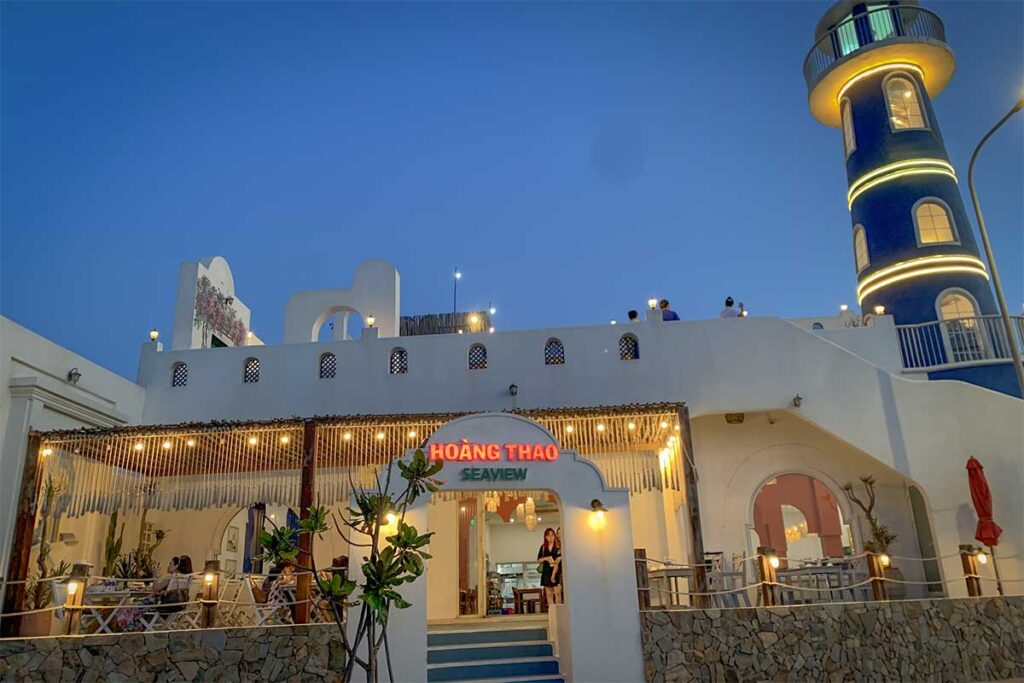
Fresh seafood is the point of eating here. Pick a busy, no-frills place near the lanes or waterfront and go straightforward—grilled fish, oysters, shellfish, banh xeo. Turnover matters more than decor. If you’re not hungry, a couple of low-key cafes do cold drinks and coffee; they’re handy for a shaded break before you walk back to the beach or Eo Gio.
7. Light coastal walks to headlands and photo points
Short paths peel off toward the headlands on either side of the bay for different angles on boats and rooftops. They’re not long hikes, but the rock slabs can be slick and there’s little shelter at midday. Aim for sunrise or late afternoon, keep an eye on footing, and bring water.
8. Temples and Ngoc Hoa monastic area (brief cultural stop)
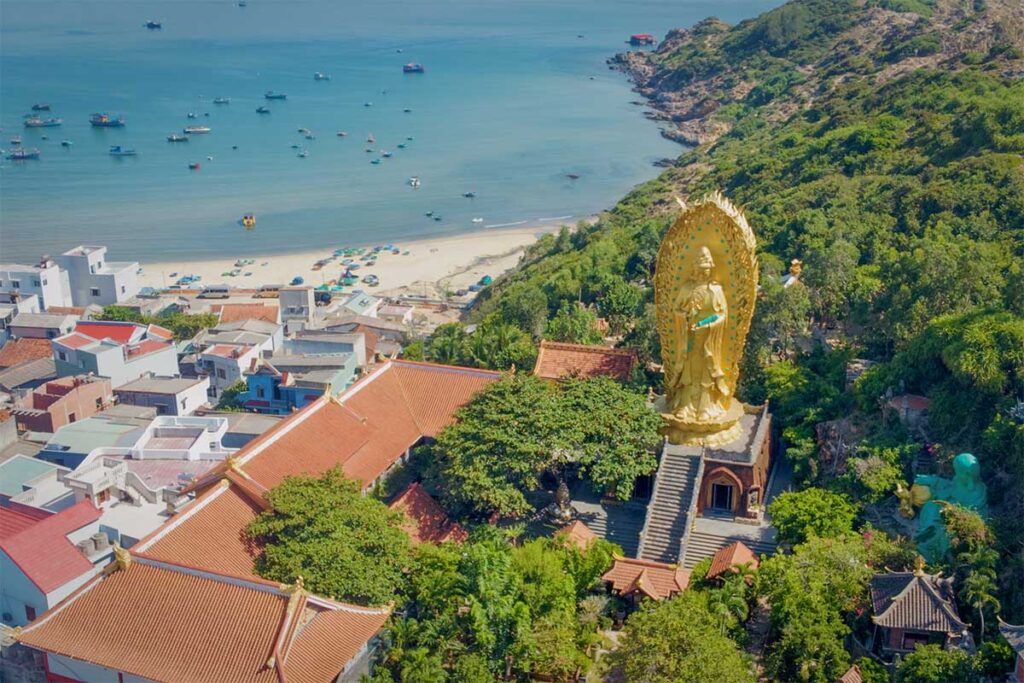
Near Eo Gio, Ngoc Hoa Monastic has a distinctive double-sided Guan Yin statue facing the sea—worth a quick look if you’re passing. Around the village you’ll also notice smaller temples and shrines woven into everyday streets. Keep voices low, cover shoulders, and drop a small donation if you step inside. Ten minutes here adds context to the fishing-village rhythm without turning the day into a temple tour.
Location & getting there
Where is Nhon Ly?
Nhon Ly sits on the Phuong Mai Peninsula northeast of Quy Nhon (Binh Dinh province). You’ll base in Quy Nhon first—fly into Phu Cat Airport, or arrive by train/bus on the North–South line—then it’s about 30–45 minutes by road across the Thi Nai bridge to the village.
Taxi or ride-hailing service
From Quy Nhon, taxis and ride-hail cars can take you straight over the bridge on paved roads. Coming back is usually fine too, but in quieter hours it’s smart to ask your driver to wait (agree on a waiting fee) or arrange a pickup time. Share a pin for the village gate or Eo Gio entrance rather than a tiny lane—drivers find those easier.
Car with driver
If you’re planning a loop—Nhon Ly + Eo Gio (and maybe a Ky Co boat)—a private car with driver is the least hassle. You set a fixed price upfront, the driver waits while you explore, and you can leave bags safely in the car. It fits well if you’re stringing this into a longer Quy Nhon beach day.
Renting a motorbike
Renting a scooter is the most flexible (and cheapest) way to go. The highway and bridge are straightforward, but village lanes are steep and narrow—park on the outskirts and walk in. Officially you need a valid license plus an IDP for insurance to be meaningful, even if rental shops don’t always ask. Wear a proper helmet, avoid riding after dark on unfamiliar roads, and watch for sand on corners near the beach.
Local bus (budget option)
There is a city bus toward the Ky Co / Eo Gio area (often shown as T22). It’s cheap, but harder for foreign travelers: timetables shift, stops are signed in Vietnamese, and drivers rarely speak English. You’ll still need to walk or take a moto-taxi from the drop-off to Nhon Ly lanes, and return buses don’t always run late. If you try it, carry small cash, share a map pin for Eo Gio or the Nhon Ly gate, and have a backup taxi plan for the way back.
Staying in Nhon Ly
Nhon Ly is a village-first place with plenty of small homestays and guesthouses for its size. It’s a good overnight if you want sunrise lanes, the dawn market, Eo Gio before crowds, or to catch the first boats to Ky Co. Expect a simple, local vibe rather than a resort scene; the beach is used by fishermen and families more than sunbathers, so think strolls and short dips, not an all-day lounge. Most overnighters are domestic travelers—if foreign visitors want a fishing-village base with more cafés and sunset bars, they often pick Bai Xep (and some Nhon Hai) instead.
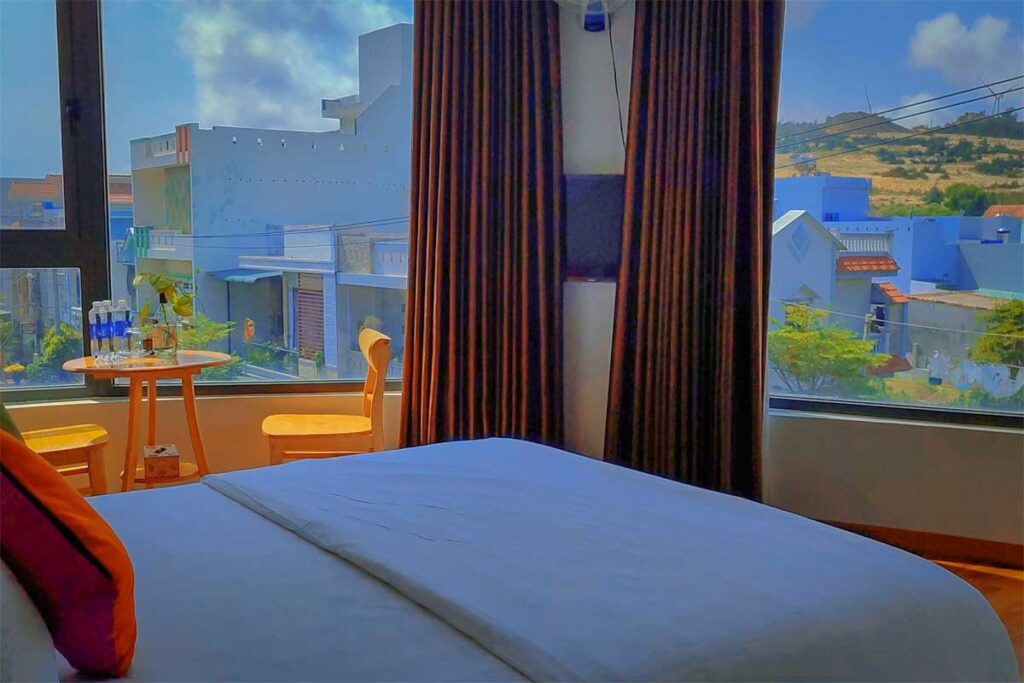
Rooms are basic-but-fine (A/C, private bathroom, Wi-Fi) and run by families; English can be limited and card payments rare, so bring cash. Lanes are steep and narrow—confirm parking or choose a place near the village edge—and expect early boat noise or weekend karaoke. Dinner options may be limited midweek; eat early or ask your host which seafood spot is cooking that day. If you need a ride back to Quy Nhon, prearrange pickup or have your host call a driver.
Practical visiting information & travel tips
Best time to visit
Aim for March–August when seas are calmer and boats run more reliably. Mornings and late afternoons are cooler and photogenic; the wind often builds toward midday and there’s little natural shade. Weekends and holidays bring more domestic visitors; midweek is quieter. In September–December you can still visit, but expect choppier water and occasional boat cancellations.
Entrance & costs
The village and beach are free. Nearby add-ons are paid separately (Eo Gio has a small ticket; Ky Co trips are priced per operator and by what’s included—boat only vs. beach entry, lunch, snorkel stop). Bring cash in small notes for parking, drinks, or a moto-taxi; cards are rarely accepted. There are no formal beach clubs here, so don’t plan on renting loungers or lockers.
What to bring
Pack sun protection, a refillable bottle, and a light cover-up for wandering the lanes. Wear sturdy sandals or water shoes—ramps and rocks can be slick—and bring a towel if you plan to swim. A dry bag is useful if you hop on a boat; a simple mask/snorkel is nice for a quick peek by the headland. Keep a little small-change cash handy for snacks and parking.
Facilities & services
Expect simple seafood spots and a couple of cafes, not a built-up strip. Kitchens keep village hours and some places close midweek, so be flexible. ATMs are scarce—withdraw in Quy Nhon—and mobile data is generally fine. Public toilets are limited; use café facilities and buy something in return.
Etiquette & photography
This is a working fishing village. Step aside for scooters, ask before close-ups, and avoid blocking alleys or work areas on the waterfront. Dress modestly away from the beach and inside temple grounds. If flying a drone, keep it discreet and well clear of people, boats, and monastery areas.
Swimming & safety notes
Swim on the quieter stretches away from the boats and any outflows where boats operate. There are no lifeguards, and conditions change with wind and tides—if in doubt, skip the dip. Winter swells (roughly Oct–Jan) can bring stronger chop and currents. Supervise kids closely; even gentle shallows can turn busy with boat traffic.
Cleanliness & environmental reality
Cleanliness is hit-or-miss near the boats and after heavy rain when runoff reaches the bay. Walk a little further from the landing area for clearer sand and water. Pack out your trash, bring a small tote for odds and ends, and avoid stepping on live coral if you snorkel during a boat stop. Refill bottles at cafés instead of buying multiple singles.
Time needed
A quick look takes 60–90 minutes for lanes, photos, and a peek at the beach. A classic half-day is 2–4 hours: wander the murals, watch the boats, grab seafood, stroll or swim, then add Eo Gio for views. If seas are calm and you have extra time, slot in a Ky Co boat; otherwise keep it simple and enjoy the village pace.
Is Nhon Ly worth visiting?
Yes—if you want a fishing village first and a beach second. You’ll enjoy Nhon Ly if you like slow, local atmosphere, photographing blue-white lanes and boats, catching the dawn market, and taking a short stroll or quick dip on a simple working beach. It also suits families on calm days (gentle shallows in parts), seafood lovers who are happy with basic quán, and anyone keen to pair village time with Eo Gio views or a Ky Co boat.
Skip it—or keep it brief—if you expect a resort beach with loungers, shade, and polished facilities. Cleanliness can be patchy near the pier, the lanes are steep and narrow, and wind or swell can make the water less inviting. The sweet spot is a half-day add-on from Quy Nhon: early start for the market, alleys and coffee, beach stroll, then Eo Gio. If you want to be first on the boats to Ky Co, an overnight in a simple homestay is workable, but most travelers will be happier basing in Quy Nhon city or Bai Xep and dipping into Nhon Ly for a few unhurried hours.
